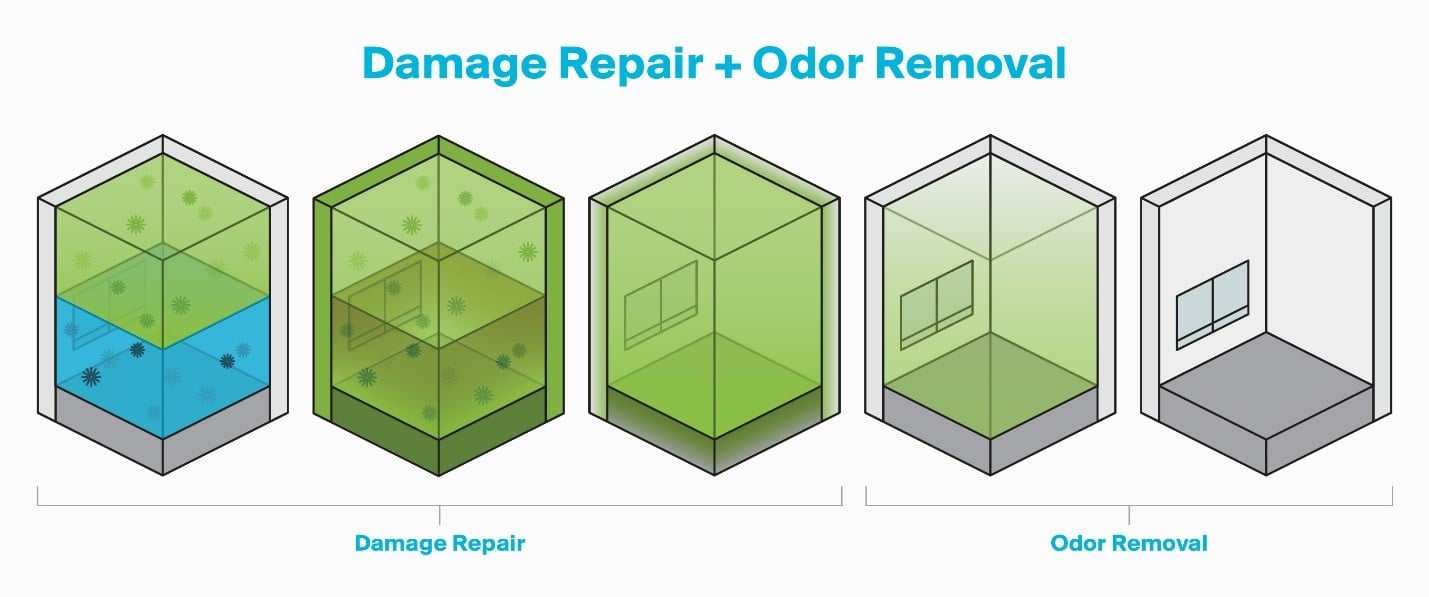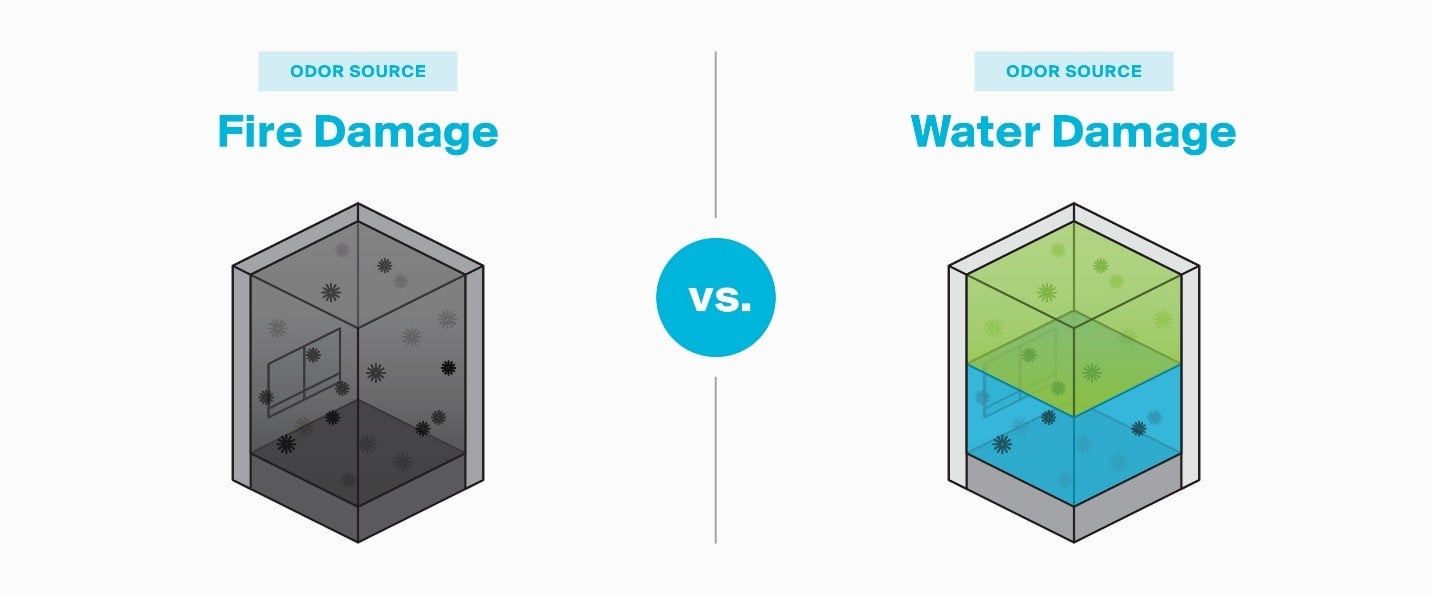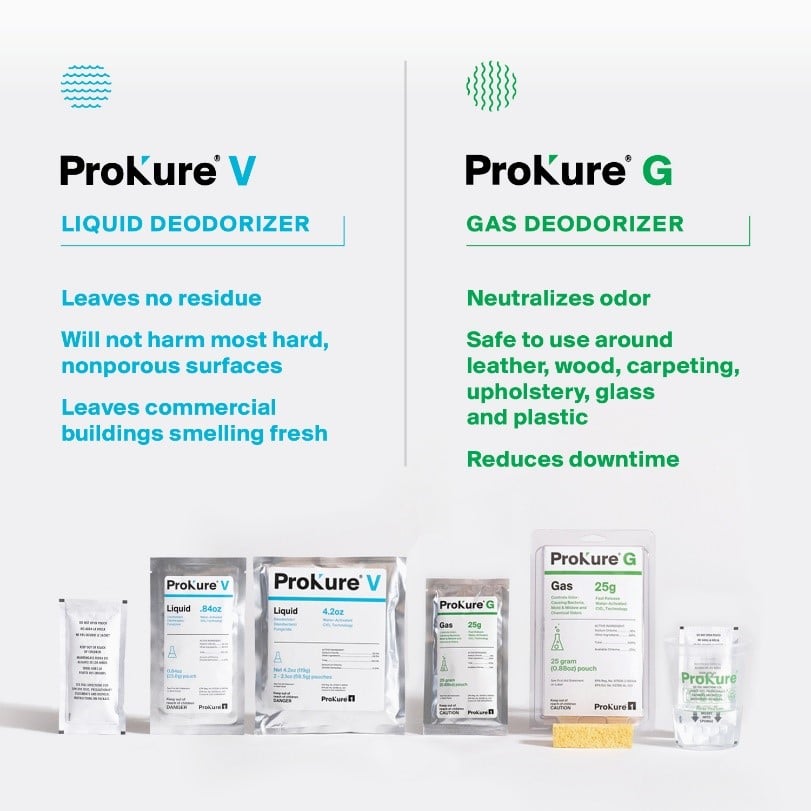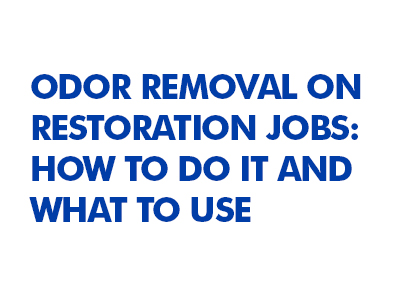Odor removal caused by water and fire damage ranks among the most challenging aspects of professional disaster response. Odors caused by smoke, soot, sewage, and black water often linger long after the damage has been remediated.
In this article, we’ll dive into the basics of odor removal for restoration jobs, the differences between fire and water damage odors, and explore how ProKure V and ProKure G can help you tackle it all.
- Jon-Don Can Help Restoration Pros Tackle Tough Odors
- Basics of Odor Removal
- Eliminating Odor: Fire vs Water Damage
- Deodorization with ProKure Products
Basics of Odor Removal
There are two phases of a deodorization job. First, damage repair. Second, odor removal.
To understand what is involved in these phases, it is useful to first visualize where they take place

Damage repair takes place on and within the surfaces of your environment. Odor removal takes place in the air and within the surfaces.
The longer the damage goes unaddressed, the deeper it will seep. To repair damage, source removal and cleaning are involved. The CDC defines cleaning as an effort that “…physically removes germs, dirt, and impurities from surfaces or objects.” The CDC continues, “This process does not necessarily kill germs, but by removing them, it lowers their numbers...”
What remains after damage repair is the reason deodorization products are used. Typically, odor-causing molecules will linger and continue to produce odor from past events. To fully remove odor, these molecules must be eliminated.
Different odor-causing events mean different odor removal protocols. This is because odor-causing molecules will vary by event type. We compare a fire event and water event below, to help explain.
Takeaways: Deodorization is complete when two things are achieved: 1) damage is repaired and 2) the odor is removed. Different odor-causing events mean different odor removal protocols.
Eliminating Odor: Fire vs. Water Damage
Odor-causing molecules will seep into their surroundings. Removing these molecules means removing the event-odor itself.
A fire event will result in different odor-causing molecules than a water event. Here’s why:

Fire & Smoke Damage: Damage from a fire event causes odor by generating smoke and heat. Extreme heat will open up the “pores” of surfaces, not unlike how the pores on our skin open up with heat. As materials burn, smoke odor will coat the surfaces and the inside of opened surface pores. As the space cools down, surface pores will close back up containing smoke odor inside. We can consider this odor a chemical source.
Water Damage: Damage from a water event causes odor by bringing odor-sources with it or activating pre-existing odor-sources within your surfaces via moisture. We can consider these sources to be biological sources, such as bacteria or fungi.
Biological and chemical odor-sources require different protocols for removal. With the added layer of restoring an environment for public reuse, considerations, such as turnaround time, cost, safety, residue and material compatability, become critical for a restoration professional’s success.
In short: deodorization can be overwhelming. To meet the needs of each job, a restoration professional is required to have a multitude of perfect responses. Imperfection means money lost to rework or extended business interuption. To win at deodorization (again and again), it’s critical to use a systematic deodorization approach that you can depend on no matter what the job throws at you.
We believe ProKure V Liquid and ProKure G Gas are the perfect responses and we explain below.
Takeaways: Odor-causing molecules seep into their surroundings. Removing these molecules means successfully deodorizing a space. Odor-causing molecules and job-needs are varied and complex. As a result, the restoration professional needs a flexible solution to achieve the “perfect response” for each odor job. We see that perfect response in ProKure liquid and gas.
Deodorization with ProKure Products
The core chemistry of ProKure products is chlorine dioxide (ClO2)—a well-known molecule that has been in use globally for a wide variety of disinfection and deodorization needs, for decades. ProKure products have harnessed the power of this molecule into dry packets—allowing for onsite water-activation of ClO2 liquid or gas.

ProKure products are used in the second phase of deodorization jobs (i.e., odor removal).
ProKure V (liquid) is applied first, saturating all affected areas with a cloth, mop or mechanical coarse spray device until the surface is thoroughly wet.
ProKure G (gas) is used second. It is designed to provide immediate relief from mold or other foul odors.
For insights on product capabilities or instructions, visit JONDON.COM/prokure1 or ProKure’s product pages for ProKure V and ProKure G.*
These EPA-registered products help restoration professionals complete a wider range of work, more profitably. This is because with ProKure, we emphasize speed, simplicity, and total coverage with effective products. ProKure V is a heavy-duty odor eliminator; easy to use—apply to surface and allow to air dry. ProKure G is fast, easy and effective; works overnight; removes residual odors.
Takeaways: The base chemistry of ProKure products is chlorine dioxide (ClO2). For best deodorization results, use ProKure V (liquid) first and ProKure G (gas) second. These products are EPA-registered and can help you complete a wider range of work, more profitably.
*It is a violation of Federal Law to use this product in a manner inconsistent with the labeling. Read the entire label and use strictly in accordance with precautionary statements and use.
Jon-Don Can Help Restoration Pros Tackle Tough Odors
When tackling tough odor jobs from fire, smoke, water, and flood loss, restoration pros trust the team at Jon-Don to have their back with the products, expertise, and support they need. With same-day shipping on in-stock orders and the nation’s largest 1- and 2-day delivery area, we get your order from shelf to job site FAST! Plus, with extra benefits like free technical support, on-site repair and maintenance technicians, financing options, and 24/7 after-hours support, we’re your one-stop shop for all your restoration business needs.















Comments